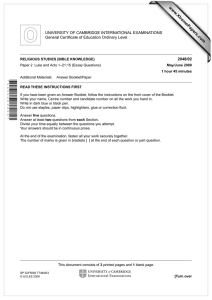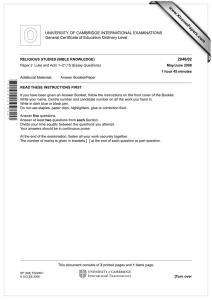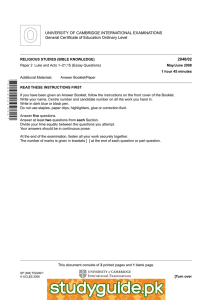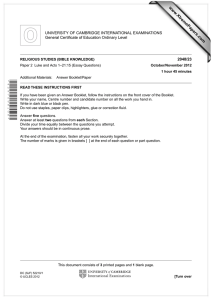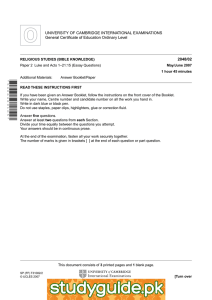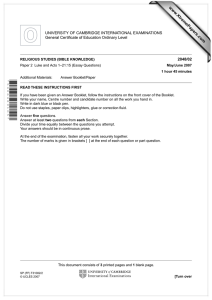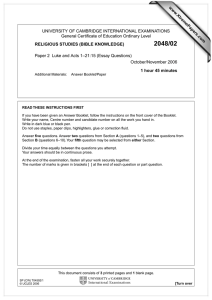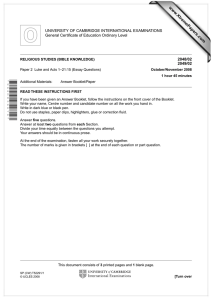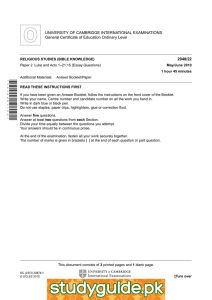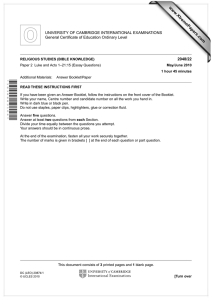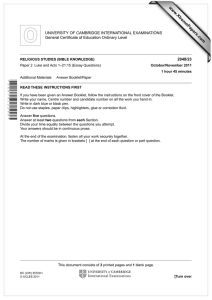UNIVERSITY OF CAMBRIDGE INTERNATIONAL EXAMINATIONS General Certificate of Education Ordinary Level 2048/02
advertisement
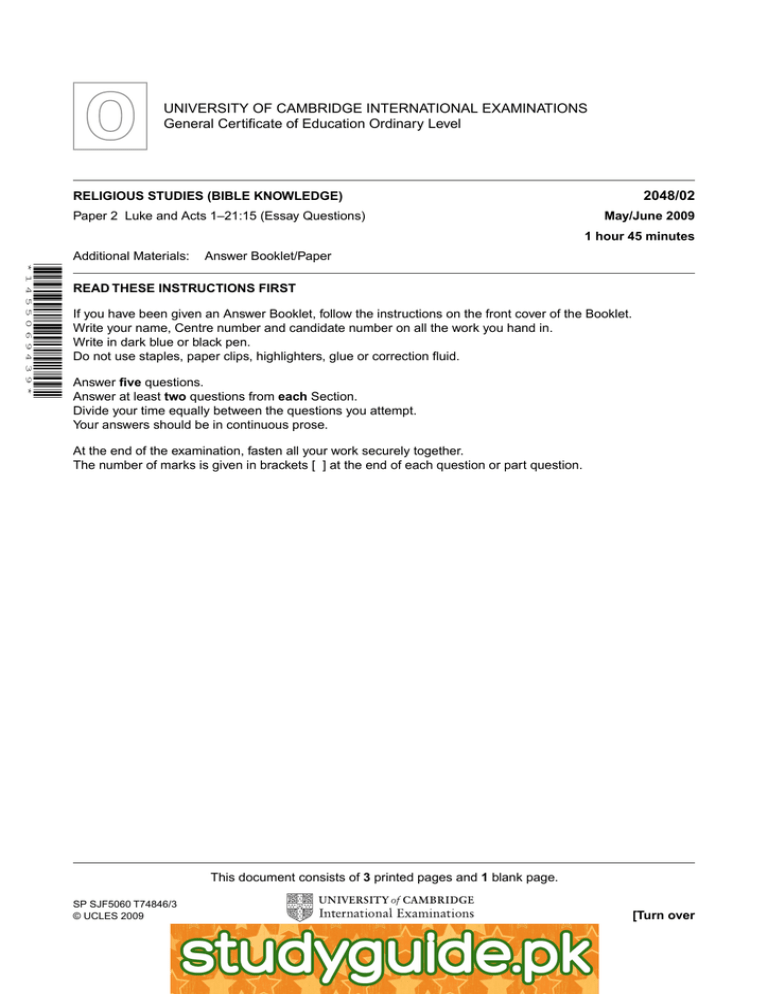
UNIVERSITY OF CAMBRIDGE INTERNATIONAL EXAMINATIONS General Certificate of Education Ordinary Level 2048/02 RELIGIOUS STUDIES (BIBLE KNOWLEDGE) Paper 2 Luke and Acts 1–21:15 (Essay Questions) May/June 2009 1 hour 45 minutes Additional Materials: Answer Booklet/Paper *1455069439* READ THESE INSTRUCTIONS FIRST If you have been given an Answer Booklet, follow the instructions on the front cover of the Booklet. Write your name, Centre number and candidate number on all the work you hand in. Write in dark blue or black pen. Do not use staples, paper clips, highlighters, glue or correction fluid. Answer five questions. Answer at least two questions from each Section. Divide your time equally between the questions you attempt. Your answers should be in continuous prose. At the end of the examination, fasten all your work securely together. The number of marks is given in brackets [ ] at the end of each question or part question. This document consists of 3 printed pages and 1 blank page. SP SJF5060 T74846/3 © UCLES 2009 [Turn over www.xtremepapers.net 2 Answer five questions. Answer two questions from Section A (questions 1–5), and two questions from Section B (questions 6–10). Your fifth question may be chosen from either section. Each question carries 12 marks. Section A The Life and Teaching of Jesus as Portrayed in Luke’s Gospel 1 2 (a) Give an account of the visit of the angel Gabriel to Zechariah, to tell him of the forthcoming birth of his son. [7] (b) What is the significance of John the Baptist for Christians? [5] (a) Describe the occasion when Jesus healed a paralytic (RSV paralysed man). [7] (b) Jesus criticised the Pharisees on various occasions during his ministry. Why did he criticise them? [5] 3 4 5 (a) Describe what happened when Jesus went with Peter, James and John to the mountain of Transfiguration. [7] (b) What does this event tell us about Jesus and his mission? [5] (a) Give an account of the Parable of The Lost Son (RSV Prodigal Son). [7] (b) What does this parable teach about forgiveness? [5] (a) Give an account of the events from when Jesus appeared to the two disciples on the road to Emmaus until he left them on that day. [7] (b) What beliefs about Jesus does this story emphasise? © UCLES 2009 2048/02/M/J/09 www.xtremepapers.net [5] 3 Section B The Birth of the Church as Portrayed in the Acts of the Apostles Chapters 1–21:15 6 7 (a) Give a brief account of the events in Acts which involved Stephen. [7] (b) Why did Stephen’s speech to the Sanhedrin provoke such a strong reaction? [5] (a) Why did Saul journey towards Damascus? Describe what happened to him on his way there. [7] (b) What do we learn from this event and what immediately followed in Damascus, about Saul (Paul) and his future mission? [5] 8 (a) Why did the Council of Jerusalem meet, and what did Peter say at the Council? [7] (b) What evidence is given in Acts to suggest that the issue the Council discussed was a problem in the early church? [5] 9 (a) Give an account of how the jailer at Philippi came to believe in God. [7] (b) What do the events at Philippi teach us about the way Paul conducted his missionary work? [5] 10 (a) What do we learn from Acts about: (i) Timothy, and (ii) Apollos? [7] (b) What do we learn about Paul’s power and authority from the incident involving Eutychus? [5] © UCLES 2009 2048/02/M/J/09 www.xtremepapers.net 4 BLANK PAGE Permission to reproduce items where third-party owned material protected by copyright is included has been sought and cleared where possible. Every reasonable effort has been made by the publisher (UCLES) to trace copyright holders, but if any items requiring clearance have unwittingly been included, the publisher will be pleased to make amends at the earliest possible opportunity. University of Cambridge International Examinations is part of the Cambridge Assessment Group. Cambridge Assessment is the brand name of University of Cambridge Local Examinations Syndicate (UCLES), which is itself a department of the University of Cambridge. 2048/02/M/J/09 www.xtremepapers.net
